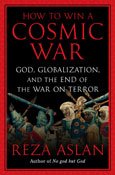Wednesday, July 1, 2009
Casual readers may view "How to Win a Cosmic War" (Random House, 2009, $26), the second book by acclaimed religious scholar Reza Aslan, as a defense of Islam. In part, this is an accurate assessment.
As an American Muslim, surely Aslan is concerned about our country's perception of Islam, which was guidedparticularly in the Bible Beltby our former president's oft-referenced and vaguely justified War on Terror. In his quest to convince readers that not all Islam is Jihadism, Aslan is both blatant and occasionally humorous. His glossary definition of the media-circulated term "Islamofascism," simply states: "This word has no meaning."
Aslan argues that militant Jihadism is unfaithful to Qur'anic doctrines, and while Jihadists have lately focused on "the Far Enemy," they kill hometown Muslims in far greater numbers. Non-Jihadist Muslims, Christians and Jews are viewed as apostates, as illustrated by the chilling account of a suicide-bomber at an Iraqi Ramadan celebration. Dressed as a clown, he lures children with toys, waiting until a crowd gathers before blowing himself up.
A cosmic war is "a battle for the sake of God" occurring in a spiritual realm, its earthly carnage notwithstanding. Aslan writes: "A cosmic war remains an absolute, eternal, unending, and ultimately unwinnable conflict." His thesisthat the only way to win a cosmic war is not to fightbecame old news the moment Obama took office. By making steps to close Guantanamo Bay, casting a positive light on the Qur'an in a recent speech at Cairo University and establishing a timetable of U.S. withdrawal from Iraq, Obama has already demonstrated an unwillingness to play Bush's cowboy game.
Still, there is value in "How to Win a Cosmic War" beyond policy suggestions. The book's efficient historical summary of Jihadism and its psychological insight into the prototype of a young, cosmopolitan suicide bomber mark it as both an Islamic primer and sociological tool, useful to anyone attempting to understand the contemporary Muslim experience.
Jihad was originally considered a "personal struggle against passions, instincts and temptations," which eventually expanded to include "the physical struggle against oppression, chaos and civil strife." But for Jihadists, Jihad is the singular doctrine of salvation, surpassing even the five pillars of the faith: prayer, alms, fasting, pilgrimage and confession. More than a religious struggle, modern Jihadism is a reactionary social movement, which Aslan comparesa bit too casuallyto civil rights and feminism. Surely Jihadists view Jihadism as liberation, and certainly there were volatile feminist and civil-rights sects, but neither of these movements are premised on anti-intellectualism and blood-thirst, as Jihadism seems to be.
But even as Aslan disassociates Islam from Jihadism (which he considers religious only in that it employs religious symbolism), it seems there is no sidestepping the fact that Islam is a sort of "gateway drug." Aslan indicates such in a reductive discussion of globalization and how the identity vacuum left by dissolving nation-states is filled with religion.
Muslims have replaced Jews as Europe's "negative pole," Aslan writes, sketching an established population that is nonetheless isolated in ghettos and unable to fully assimilate, even as the European Union grants other Europeans the privilege of continental citizenship. But in America, the one nation in the world where Muslims enjoy complete religious freedom, they also live in demographically diverse neighborhoods and earn above-average incomes. Unlike being German or Iranianwhich come only with birthדAmerican is something you can become," Tehran native Aslan says, betraying a fierce pride for his adopted home.
Aslan's rationale is that a nationalistic identity crisis coupled with an adolescent predilection for rebellion propels unassuming middle-class European youthoften from only moderately religious familiesto take up Jihadism, citing the plight of Palestine as their rallying cry. But even though Jihadists use Palestine to establish a "pan-Islamic identity," there are ultimately no earthy concessions that Israel and the West can make to satisfy the blood-thirst of a cosmic war.
If Aslan is at all positing how to "win" a cosmic war as the title claims, it is through addressing the identity issues of those who turn to Jihadism. This doesn't mean we should ignore the humanitarian grievances of the Islamic world, but the two are separate issuesthe latter is an earthly matter with no bearing on a cosmic conflict.

Comments
Use the comment form below to begin a discussion about this content.
Sign in to comment
Or login with:
OpenID